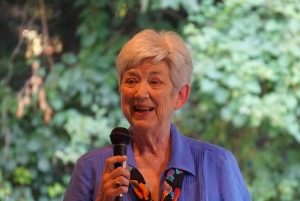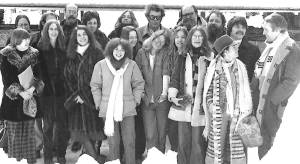Celebrating the Radical Roots of the MFA Program for Writers
In 1976, Ellen Bryant Voigt, renowned poet and master teacher, offered a first cohort of students the opportunity to participate in an educational experiment: a writing program that featured close, one-on-one mentorship with other writers within those students’ lives as workers, caretakers, and people in the world. This experiment was the founding seed that would become the MFA Program for Writers, the nation’s first low-residency creative writing program, at Vermont’s Goddard College.
In a transitional period when the writing world was moving from no formal education to the emergence of MFA programs, this program was the first of its kind. It proved to be the first spark in a storied program where teaching writers guide the way for emerging ones through rigorous craft, a curriculum delivered in a flexible model, and two yearly intensive retreats designed to foster community and education without significantly uprooting students’ lives for their creative educations. The standard for all low-residency programs in the country were then based on this model.
After several years, Goddard College came to financial difficulties. Rather than seeing the program changed entirely by austerity measures, the entire faculty resigned together in November 1980. It seemed then that that would be the end of the MFA Program, if not for a chance meeting of former faculty member Louise Glück with the then president of Warren Wilson College, Reuben A. Holden. After that, it was only a matter of time before the program was revived as the MFA Program for Writers at Warren Wilson College.
Transitioning to Warren Wilson College and Black Mountain
The change of scenery from the Green Mountains of Vermont to the Black Mountains of North Carolina became the first of many occasions for the program to transform. It was apt that the program would be reborn in the former location of Black Mountain College. Here, the curriculum of faculty-pair workshops, program-wide craft lectures, and student-centered mentorship encouraged exposure to a variety of aesthetics while developing each student’s unique voice.
It was also not only the students who gained from this experience—collaboration runs high in the faculty ethos as well, and since its earliest days, faculty have attended each other’s lectures as well as working together when paired for workshops. Many of these lectures have served as the basis of published anthologies whose proceeds go towards student scholarships.
MFA Community Values: Rigor, Artistry, Community, and Egalitarianism
There are not and have never been merit scholarships in the MFA Program. Why? Because Voigt understood that tiers of support translated to tiers of assumed preference, no matter what the basis for those merit scholarships were. All students in the MFA Program therefore start and end on equal footing.
Equal footing as in: that moment when you wake up and realize that you should regret it if you never let yourself write; when you struggle finding hours around your week to write; the hard and lonely work that creative acts require. In its intent since 1976, the MFA Program was radically designed for a radical idea: that art can be achieved through collective support—community.
Today, almost fifty years after its inception, the prestigious MFA Program for Writers at Warren Wilson College remains one of the top writing programs in the nation. It also continues to grow and change while maintaining its heart: writers teaching writers with rigor and care.
Our faculty have won virtually every major honor in the country, including MacArthur and Guggenheim Fellowships, Pulitzer Prizes, and the National Book Award. Several have served as state poets laureate, and two have been named national poets laureate.
Students of the program range in age from their early twenties to mid-sixties, in profession from teacher and journalist, doctor and bartender, to lawyer and lumberjack, and join us from all over the world from locations such as Hong Kong, India, France, Nigeria, Canada, and –.. Our alumni have published hundreds of books, and their work has been featured in The New Yorker and on the front page of The New York Times Book Review.
Revolving around a curriculum built for equality rather than egotism, community rather than individualism, and daring rather than settling on laurels, the MFA Program has revision built into its radical roots. The rest is not only history, but a future as well.


